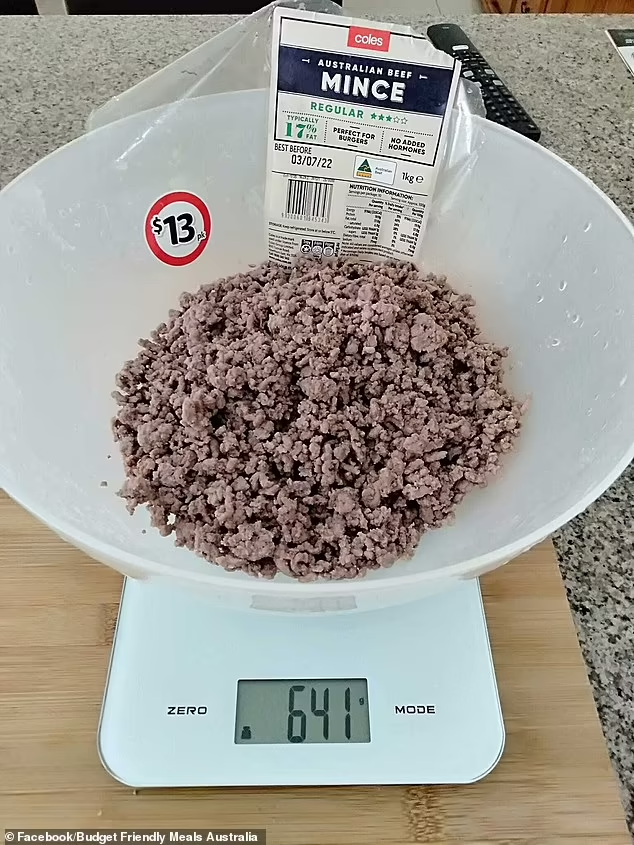Is your mince shrinking? Home cooks explain why one shopper's incorrect beef mince preparation is causing the meat to shrink
By
- Replies 7
We've all been there. You go to the store to purchase a pack of meat only to find that the price has gone up, but the weight stays the same.
This phenomenon, known as “shrinkflation”, is frustrating for consumers and can cause them to lose faith in brands.
In a time when wages are stagnant and the cost of living is rising, shrinkflation is a real problem. It's hard enough to keep up with the rising cost of groceries, but when prices go up and the amount of product you're getting decreases, it's even more difficult.
That's why it's not surprising that one Coles shopper slammed the retailer for allegedly duping customers into buying meat packs that are advertised as "1 kilogram" yet only weigh 650 grams when cooked. However, home cooks have called out the shopper after they pointed out that the mum made a mistake, leading to the "shrinking" of the meat.
So, what exactly is this error that can cause the meat to shrink? Let's find out!
Taking her frustration to social media, the Perth shopper posted her complaint in a popular Facebook group, writing: "Cooked and drained. All water. It's getting worse. So disappointed."
The customer also posted a photo of the cooked three-star Australian beef mince from Coles, showing the ingredient on the scale weighing 641grams.

Photo of the cooked beef mince being weighed on a scale. Credit: Facebook/Budget Friendly Meals Australia.
"Where do you shop that gives you value for money for mince please?" she asked.
As numerous group members offered their thoughts and voiced their grievances, the Coles customer's post was flooded with replies.
Other shoppers offered some recommendations to the customer, sharing their own ways to score quality meat buys.
One user wrote: "I live in Melbourne but now buy all our meat from a reputable butcher in the area! The quality is so much better, a little dearer but well worth it."
"I'm in Perth and I'm finding mince at our local IGA to be much better quality than what I buy from Coles or Woolies because we have a butcher out the back who does all of the prep for non-pre-packaged items," another advised.
A third chimed in: "I get my mince from Aldi and get no water or fat. It's fantastic."
But one home cook had a quick explanation for the weight difference.
According to her, draining the mince would have removed 170 grams, or "usually 17% fat," as specified on the packet.
She said: "At 17 per cent fat, 170g or thereabouts would have been fat. Hope you didn't pour that down the sink now your meat will have less taste. I buy this mince regularly but also buy 2kg for $20 from a local butcher sometimes."
Others backed the claim of the home cook, offering their explanations of the phenomenon.
One comment read: "It's normal for meat to lose weight when cooked. It's like chicken or beef steaks, when cooked they shrink. And if you had just cooked it a bit more and not drained it, you would have found so much more flavour in your dishes."
"If you buy five-star Coles mince rather than regular it's definitely a lot better, more expensive but you're getting meat, not fat that melts away into juices once it's cooked. However, the best bet is butchers though maybe more expensive again," another suggested.
Every one of us is feeling the pinch of inflation as it hits the prices of commodities. No wonder Australians are growing more aware of and picky about the things they buy, in a bid to get the most out of their hard-earned money.
We recommend checking out the Money Saving Hacks section on the SDC website so you can stay on top of the latest deals and discounts and learn more about how to save money in these challenging times.
Have you experienced a similar dilemma before? Share your stories with us in the comments below!
We also recommend checking out this article to learn more about how you save money by purchasing meat products from online butchers instead of supermarkets.
This phenomenon, known as “shrinkflation”, is frustrating for consumers and can cause them to lose faith in brands.
In a time when wages are stagnant and the cost of living is rising, shrinkflation is a real problem. It's hard enough to keep up with the rising cost of groceries, but when prices go up and the amount of product you're getting decreases, it's even more difficult.
That's why it's not surprising that one Coles shopper slammed the retailer for allegedly duping customers into buying meat packs that are advertised as "1 kilogram" yet only weigh 650 grams when cooked. However, home cooks have called out the shopper after they pointed out that the mum made a mistake, leading to the "shrinking" of the meat.
So, what exactly is this error that can cause the meat to shrink? Let's find out!
Taking her frustration to social media, the Perth shopper posted her complaint in a popular Facebook group, writing: "Cooked and drained. All water. It's getting worse. So disappointed."
The customer also posted a photo of the cooked three-star Australian beef mince from Coles, showing the ingredient on the scale weighing 641grams.
Photo of the cooked beef mince being weighed on a scale. Credit: Facebook/Budget Friendly Meals Australia.
"Where do you shop that gives you value for money for mince please?" she asked.
As numerous group members offered their thoughts and voiced their grievances, the Coles customer's post was flooded with replies.
Other shoppers offered some recommendations to the customer, sharing their own ways to score quality meat buys.
One user wrote: "I live in Melbourne but now buy all our meat from a reputable butcher in the area! The quality is so much better, a little dearer but well worth it."
"I'm in Perth and I'm finding mince at our local IGA to be much better quality than what I buy from Coles or Woolies because we have a butcher out the back who does all of the prep for non-pre-packaged items," another advised.
A third chimed in: "I get my mince from Aldi and get no water or fat. It's fantastic."
But one home cook had a quick explanation for the weight difference.
According to her, draining the mince would have removed 170 grams, or "usually 17% fat," as specified on the packet.
She said: "At 17 per cent fat, 170g or thereabouts would have been fat. Hope you didn't pour that down the sink now your meat will have less taste. I buy this mince regularly but also buy 2kg for $20 from a local butcher sometimes."
Others backed the claim of the home cook, offering their explanations of the phenomenon.
One comment read: "It's normal for meat to lose weight when cooked. It's like chicken or beef steaks, when cooked they shrink. And if you had just cooked it a bit more and not drained it, you would have found so much more flavour in your dishes."
"If you buy five-star Coles mince rather than regular it's definitely a lot better, more expensive but you're getting meat, not fat that melts away into juices once it's cooked. However, the best bet is butchers though maybe more expensive again," another suggested.
Every one of us is feeling the pinch of inflation as it hits the prices of commodities. No wonder Australians are growing more aware of and picky about the things they buy, in a bid to get the most out of their hard-earned money.
We recommend checking out the Money Saving Hacks section on the SDC website so you can stay on top of the latest deals and discounts and learn more about how to save money in these challenging times.
Have you experienced a similar dilemma before? Share your stories with us in the comments below!
We also recommend checking out this article to learn more about how you save money by purchasing meat products from online butchers instead of supermarkets.







